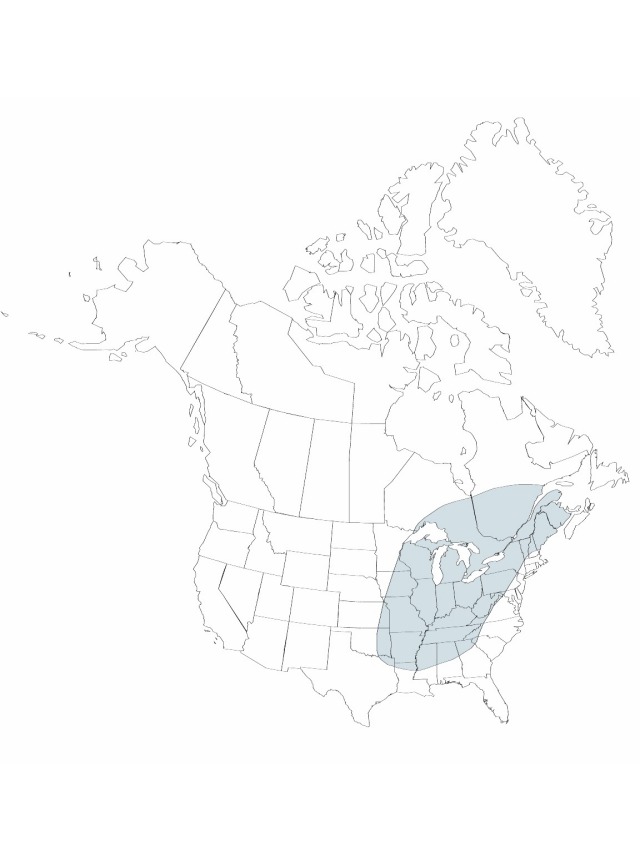Difference between revisions of "Juncus anthelatus"
Novon 9: 11. 1999.
FNA>Volume Importer |
imported>Volume Importer |
||
| (6 intermediate revisions by 2 users not shown) | |||
| Line 7: | Line 7: | ||
|year=1999 | |year=1999 | ||
}} | }} | ||
| − | |basionyms={{Treatment/ID/ | + | |special_status={{Treatment/ID/Special_status |
| + | |code=E | ||
| + | |label=Endemic | ||
| + | }} | ||
| + | |basionyms={{Treatment/ID/Basionym | ||
|name=Juncus tenuis var. anthelatus | |name=Juncus tenuis var. anthelatus | ||
|authority=Wiegand | |authority=Wiegand | ||
| + | |rank=variety | ||
| + | |publication_title=Bull. Torrey Bot. Club. | ||
| + | |publication_place=27: 523. 1900 | ||
}} | }} | ||
|synonyms={{Treatment/ID/Synonym | |synonyms={{Treatment/ID/Synonym | ||
|name=Juncus macer var. anthelatus | |name=Juncus macer var. anthelatus | ||
|authority=(Wiegand) F. J. Hermann | |authority=(Wiegand) F. J. Hermann | ||
| + | |rank=variety | ||
}} | }} | ||
|hierarchy=Juncaceae;Juncus;Juncus subg. Poiophylli;Juncus anthelatus | |hierarchy=Juncaceae;Juncus;Juncus subg. Poiophylli;Juncus anthelatus | ||
| Line 36: | Line 44: | ||
-->{{#Taxon: | -->{{#Taxon: | ||
name=Juncus anthelatus | name=Juncus anthelatus | ||
| − | |||
|authority=(Wiegand) R. E. Brooks | |authority=(Wiegand) R. E. Brooks | ||
|rank=species | |rank=species | ||
| Line 49: | Line 56: | ||
|publication title=Novon | |publication title=Novon | ||
|publication year=1999 | |publication year=1999 | ||
| − | |special status= | + | |special status=Endemic |
| − | |source xml=https:// | + | |source xml=https://bitbucket.org/aafc-mbb/fna-data-curation/src/2e0870ddd59836b60bcf96646a41e87ea5a5943a/coarse_grained_fna_xml/V22/V22_218.xml |
|genus=Juncus | |genus=Juncus | ||
|subgenus=Juncus subg. Poiophylli | |subgenus=Juncus subg. Poiophylli | ||
Latest revision as of 20:30, 5 November 2020
Herbs, perennial, cespitose, to (3–)7–9 dm. Cataphylls 1–2. Leaves basal, 2–3(–5); auricles transparent, 2–3.5 mm at summit of leaf sheath, apex acutish, membranous; blade flat, (10–)20–30 cm × 0.5–2.3 mm, margins entire. Inflorescences 10–100-flowered, diffuse; internodes of monochasia greater than 6 mm, primary bract usually exceeding inflorescence. Flowers: pedicels 0.1–0.3(–3) mm; bracteoles 2; tepals green, lanceolate, 3.2–4.5 × 0.7–1 mm; outer and inner series nearly equal, in fruit apically erect; stamens 6, filaments 0.8–1.1 mm, anthers 0.3–0.7 mm; style 0.2 mm. Capsules tan, 1-locular, widely ellipsoid to obovoid, 2–3.2 × 1.1–1.6 mm. Seeds tan, ellipsoid, 0.33–0.556 mm, not tailed. 2n = 80.
Phenology: Flowering and fruiting spring.
Habitat: Exposed or partially shaded sites in moist or seasonally wet, sandy or clay soils
Distribution

Alta., B.C., Man., N.B., Nfld. and Labr., N.W.T., N.S., Ont., P.E.I., Que., Sask., Yukon, Ala., Alaska, Ariz., Ark., Calif., Colo., Conn., Del., D.C., Fla., Ga., Idaho, Ill., Ind., Iowa, Kans., Ky., La., Maine, Md., Mass., Mich., Minn., Miss., Mo., Mont., Nebr., Nev., N.H., N.J., N.Mex., N.Y., N.C., N.Dak., Ohio, Okla., Oreg., Pa., R.I., S.C., S.Dak., Tenn., Tex., Utah, Vt., Va., Wash., W.Va., Wis., Wyo.
Discussion
Selected References
None.